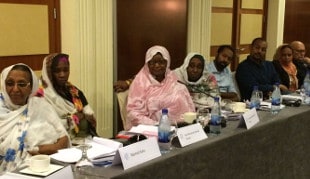Max Planck Foundation conducts three-day workshop on Comparative Constitutional Law in Khartoum, Sudan
From 5–7 October 2015 the Max Planck Foundation organized a Capacity Building Workshop on the Role of the Constitution and the Separation of Powers for a group of about 25 Sudanese representatives of various political parties and stakeholders in Khartoum, Sudan. The workshop was the fourth component of a series of workshops within a comprehensive program on constitutional commitments (Constitutional Support in Sudan: Trust Building Measures), which the Max Planck Foundation is implementing in Sudan since 2014. The workshop was conducted with the generous support of the German Federal Foreign Office.
For the three-day workshop, the Foundation convened an inclusive and representative group of officials, policymakers as well as state and non-state actors representing the various political viewpoints in the Sudanese society for a detailed discussion on constitutional law issues on the basis of a comparative approach. The workshop distinctly aimed at providing a neutral forum for a wide range of representative viewpoints in Sudan on the main ideas that exist regarding the future constitutional order in Sudan. The format of the workshop was designed to provide a collegiate atmosphere for dialogue by allocating separate sessions exclusively to discussions leaving enough room for the various Sudanese groups to raise their questions and share their concerns, statements and viewpoints. Accordingly, it attempted to imbed a spirit of communication, trust and commitment among the participants towards a peaceful dialogue and constitutional process.
The invite-only forum in the workshop topic-wise focused on the different types of democratic governmental systems, the key aspects and elements of the horizontal separation of powers as well as the role and significance of a constitution in a legal system in general and in Sudan in particular. The Foundation implemented the workshop with the support of two renowned Sudanese experts as well as two high-ranking international experts who conducted detailed comparative and technical presentations and further also enriched the workshop discussions with their comprehensive knowledge and experience.
The overall project aims in the long run to support Sudan in its National Dialogue. The Foundation intends to provide legal support and assistance to the far-reaching National Dialogue in Sudan through capacity-building measures for an inclusive group of actors. Individual project activities include discussions on the elements and structure of constitutional processes as well as the design of the constitutional content. Ultimately, a successful National Dialogue can only be achieved through cooperation between participants and an inclusive process. Project activities thus use a comparative legal approach to promote and encourage discussions about options for constitutional arrangements between different interest groups. This requires building mutual trust on an on-going basis and increasing the confidence of participants in one another and the whole process through various activities, such as joint capacity building measures.

